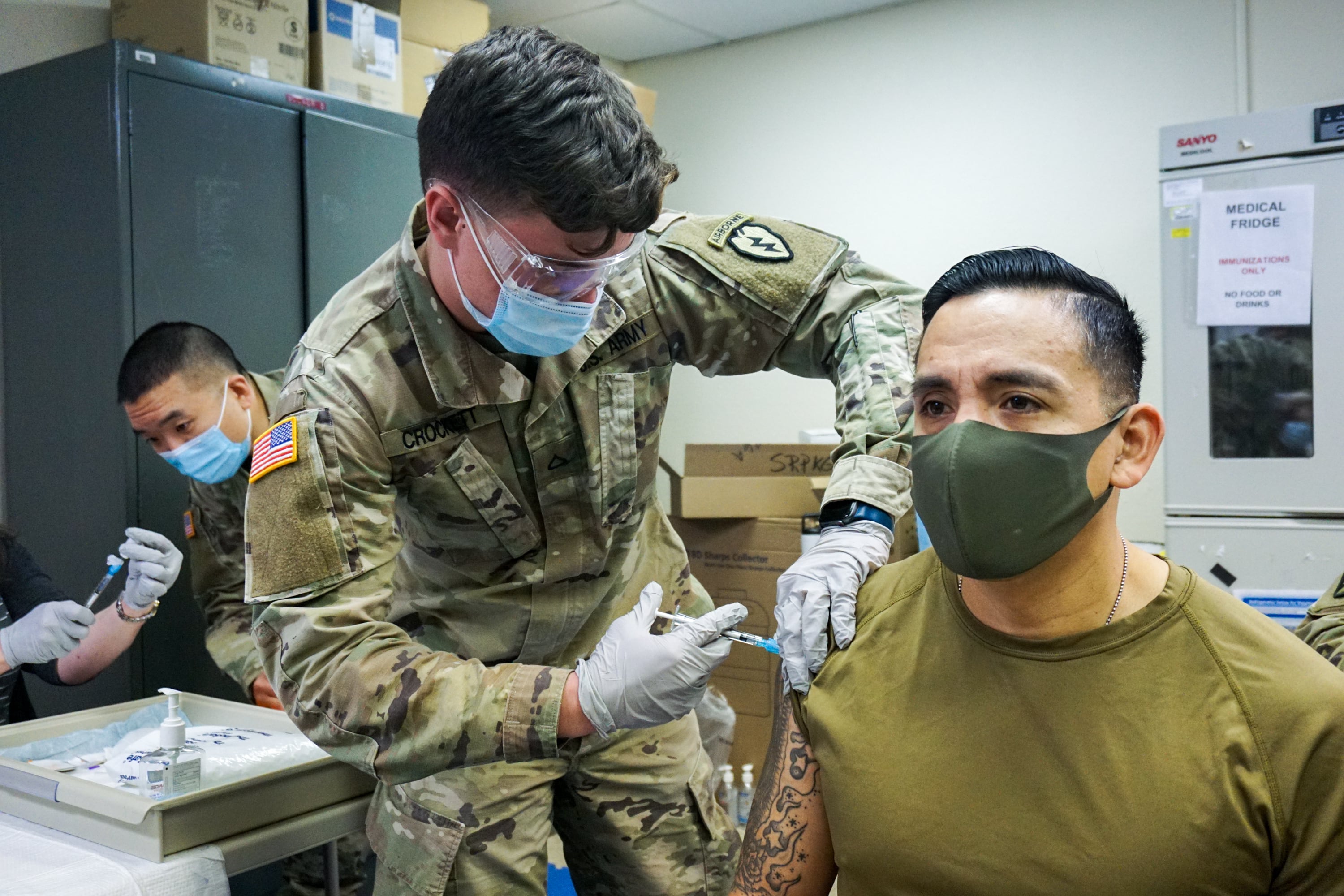The coronavirus vaccine remains optional for soldiers, but could become mandatory once the vaccine is issued full Food and Drug Administration licensure or if the president waives the option for service members to opt out.
Neither are likely right now, especially given the limited supply of vaccine, so Army leaders are encouraging soldiers who have been prioritized for vaccination to take it. That includes young troops unlikely to become seriously ill from COVID-19 or those who have already caught the virus and recovered from it, since the duration of immunity is unknown.
“If you get vaccinated, you’re doing it to protect someone else who might be at risk,” said Dr. Steven Cersovsky, deputy director of the Army Public Health Center, during an Army town hall Monday. “As long as you remain unvaccinated, you can become infected and pass it along to other people. You’re part of that transmission chain.”
Both the Pfizer and Moderna vaccines were approved under an emergency use authorization by the FDA, which means they haven’t completed all of the multiple rounds of rigorous testing required before the FDA clears them. The expedited process still requires FDA reviewers to pour over all safety data from the first two phases of clinical trials and partial data from the third phase.
Cersovsky expects the FDA to fully license the vaccine, but did not give a specific timeline. Although the commander in chief can issue a waiver making the COVID-19 vaccine mandatory, that has not been done.
“I think the issue now is that we still have a limited supply and we need to prioritize those individuals who receive the vaccine,” Cersovsky said. “We want to stick to that prioritization schema. … And at some point when we have enough vaccines, then I think you’ll see perhaps a decision made as to whether this will be mandatory immunization.”
Any side effects caused by the COVID-19 vaccine will be tracked by the Defense Department in accordance with FDA requirements, said Army Surgeon General Lt. Gen. Scott Dingle.
“We’re very confident in the stringent regulatory process and the requirements of the FDA,” Dingle said. “The manufacturers are required to submit their raw data for the FDA to review. Safety, immune response and efficacy data from the trial stages are submitted to the FDA before they’re authorized for use and distributed.”

About one third of Defense Department personnel who have been offered the vaccine have turned it down. Those numbers concerned some lawmakers on the House Armed Services Committee during a hearing last week.
“With new variants popping up across the globe, I’m not sure we can wait two years” for full FDA approval, said Rep. Mike Rogers, R-Ala. “It’s critical for our national security that every service member, as well as DoD civilian personnel and contractors, receive vaccines as soon as possible.”
There are a lot of reasons why soldiers may not be taking the vaccine, including a personal choice related to one’s medical history, unease with the vaccine’s approval process or disqualification by a physician, according to Army Inspector General Lt. Gen. Leslie Smith.
“Or it could be that they just want to wait to see how others react to the vaccine,” Smith said Monday at the town hall. “It also could be that they simply missed their appointment. Individuals can also formally decline to get the vaccine without offering a reason at all. As frustrating as it might be to hear this, that’s the truth.”
RELATED

Experts believe the vaccines are safe for women trying to become pregnant in the short- or long-term, but there’s still limited data about the safety for people who are pregnant or lactating, since those cases weren’t studied in the original vaccine trials.
“Each person needs to make an individual decision with their health care provider regarding getting the vaccine while pregnant, lactating or if they plan on becoming pregnant in the near future,” Cersovsky said.
If you’ve had a bad reaction to previous flu vaccines, that doesn’t mean you’re at a greater risk to the COVID-19 vaccine, according to Cersovsky. If you do have a poor reaction to the first of the two-shot vaccination, such as difficulty breathing, then you should not take the second dose.
There are new variants of the COVID-19 virus that have emerged in South Africa and the United Kingdom. Right now, it appears that the current vaccines are effective in combating those new strains. Early studies show the current vaccines can protect against the U.K. variant, which is expected to become predominant in the United States this spring.
“These vaccines are so good that, even with some diminished ability of those vaccines to respond to certain variants, there is still sufficient immunity from them to protect us,” Cersovsky said. “The other important thing is that the more people who get vaccinated as quickly as possible, the level of virus transmission decreases, which gives it less opportunity to continue to mutate.”
Kyle Rempfer was an editor and reporter who has covered combat operations, criminal cases, foreign military assistance and training accidents. Before entering journalism, Kyle served in U.S. Air Force Special Tactics and deployed in 2014 to Paktika Province, Afghanistan, and Baghdad, Iraq.




